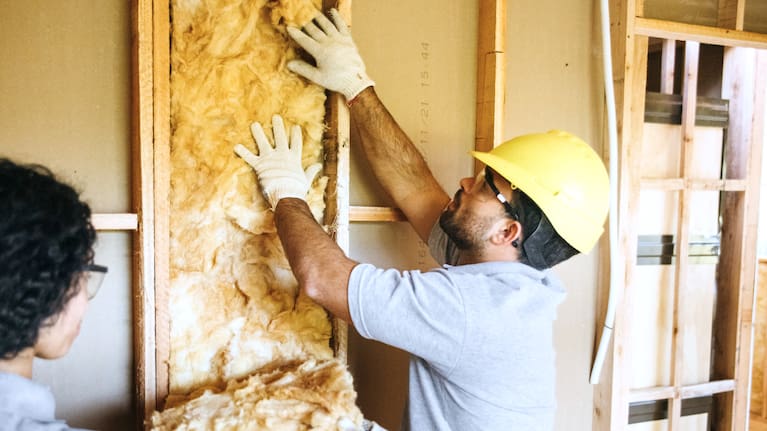Opinion: The Minister for Building and Construction and a senior lecturer in architectural technology share their views on what potential changes to insulation requirements might mean for New Zealand’s homes.
Building and Construction Minister Chris Penk has asked officials to investigate the impacts of recent changes to insulation standards for new homes.
Penk cited concerns from builders and developers that the H1 standard was costly and causing overheating in some homes.
Building Minister Chris Penk has tasked officials to look at whether the rules, introduced last year, are making new builds too expensive. (Source: 1News)
However, other groups, including health experts, Certified Builders, and the Green Building Council, have said they wouldn’t welcome any rolling back of insulation standards.
Here, Penk and academic Dr Sarosh Mulla share their thoughts on the matter.
Dr Sarosh Mulla, senior lecturer in architectural technology

What do you think about NZ’s current home insulation standards?
The current standards have only just caught up with other developed nations in terms of building insulation and thermal performance.
The old rules, which the Government is considering reverting to, were woefully poor, leading to new homes being built that were still cold and hugely inefficient to heat.
When I speak to architects around the world about the way new houses were being built in New Zealand, even just a year or two ago, they can’t believe how poor that standard was.
Should last year’s increases in the H1 requirements for home insulation and glazing be adjusted? Why/Why not?
Let’s be clear, what is being proposed isn’t an adjustment, it’s a reduction.
The H1 requirements are the lowest minimum standard, as are all the requirements of the Building Code. They aren’t high performance levels that constitute “best practice”. They are the lowest acceptable level for a home to be warm, dry, and energy efficient.
We should not forget that the purpose of such rules is in part to safeguard the public from detrimental health effects.
We shouldn’t go back to the old standards and condemn more generations of children to living in cold and inefficient homes that contribute to climate change.
A professor of public health is arguing for better housing as the Construction Minister tries to drive down the price of building homes. (Source: Breakfast)
If the insulation standards brought in last year were to be rolled back, what do you think that would achieve for New Zealanders and their homes?
The vast majority of new homes built in New Zealand are built to the minimum required standard of the Building Code.
This means that most of us live in a home that represents the standards of the time, with limited ways of making cost-effective improvements.
If the standard was rolled back, all that would be achieved would be the creation of poor-quality homes with bigger carbon footprints over their lives, and more people suffering adverse effects to their health from living in these homes. It would be a terrible outcome for literally generations of Kiwis who would occupy these homes for decades to come.
There is something fundamentally unjust about the Minister’s proposal to review the standards, as it is the poor who will suffer the most. These people inevitably live in houses built to the bare minimum standard. The wealthy have been insulating their homes well above the standard for decades.
What would you say to people who argue that the current insulation standards are making new homes more expensive and causing issues like overheating?
It’s hard to imagine a less effective way of reducing building costs than rolling back the H1 standard.
Homes don’t only cost money to build; they cost money to run. Often, very small investments in the quality of building at the time of construction can create huge savings over the course of the life of the building for the occupant.
I can’t help but think that the occupant of the home is being forgotten here, while the needs of the developer, who builds and instantly sells, are being prioritised. The suggestion that if standards were reduced, the savings in insulation cost would be passed on to the consumers by benevolent developers is very naive, if not disingenuous.
There is also no credible evidence that I have seen that the H1 standards are contributing to overheating, and I think that making that suggestion, while many people struggle through a cold winter in cold houses, is frightfully tone-deaf.
To the Minister, I would say that there are many very good institutions around the country that can provide him with an education in the fundamentals of building science.
Chris Penk, Minister for Building and Construction

What do you think about NZ’s current home insulation standards?
All New Zealanders deserve to have a warm dry home, but for that to occur housing must be affordable.
I am laser focused as Minister on ensuring building in New Zealand is easier and cheaper. The cost of building a house has increased by 40% since 2019 and out-of-control building costs have a chilling impact on first home buyers and tragically push the Kiwi dream of homeownership further away.
Builders across New Zealand frequently raise concerns with me over the new H1 requirements in the Building Code that came into force late last year. This is why I have asked my officials to investigate these concerns to ensure the new requirements are not counterproductive.
In the middle of a housing crisis, while Kiwis are still living in cars and emergency accommodation such as motels, it is critical that we don't create artificial barriers through well intended but badly implemented policies.

Should last year’s increases in the H1 requirements for home insulation and glazing be adjusted? Why/Why not?
Cabinet has not made any decisions in relation to the H1 requirements.
I have instructed the Ministry of Business, Innovation and Employment to look into the real-world impacts of these changes, but no decisions have been made at this stage.
Feedback from builders on the ground is that the implementation of these new requirements is too prescriptive and adds tens of thousands of dollars to the cost of a home. This is well above what was originally anticipated when the policy was introduced and consulted on with the sector.
In addition, we are hearing feedback that in warmer parts of New Zealand, such as Northland, residents are reporting that they are having to expend more energy on cooling their homes, making the H1 requirements not only expensive but also potentially counterproductive. MBIE has also received concerns over ventilation issues such as condensation and mould inside walls and roofs that could result from the new requirements.
If the insulation standards brought in last year were to be rolled back, what do you think that would achieve for New Zealanders and their homes?
Cabinet has not made any decisions in relation to the H1 requirements.
What would you say to people who argue that the current insulation standards save on heating costs and create healthier homes and should therefore stay?
More than half of all homes in New Zealand were built before insulation was required in 1979.
Rather than new builds, these are the homes which are often of poor quality and contribute to poorer health outcomes for Kiwis and higher energy bills.
My focus as Minister is on ensuring that we can make it easier to build and that includes retrofitting existing house stock to make them warmer, dryer and healthier, and I am working with my officials and ministerial colleagues on progressing work in this space.
There are clear benefits of additional thermal requirements in homes however this must be implemented in a way that does not place unreasonable upfront costs onto Kiwis.






















SHARE ME